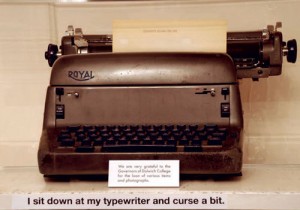
Learning from other writers has its difficulties, not the least of which is considering your heroes “other writers” in the first place: there’s something frightful and vertiginous about taking on e.g. Nabakov or Ted Hughes as a colleague. It turns out that that’s true even of the infinitely cuddlier P.G. Wodehouse, and then there’s the whole subject of context to consider. Wodehouse began his career when the demand for writing was at its height. In the absence of radio and television, Edwardian Britain supported hundreds of dailies, weeklies and monthlies, all needing to be filled.an England supported in the absence of radio and television. In the Forties, an era of writer’s marketplace bliss from our perspective, Wodehouse saw the opportunities narrowing and wondered out loud how young writers got started.
But there are such things as eternal verities and universal principals, in Wodehouse’s working style as anywhere else, and in that spirit, here are some P.G. tips:
Focus. Determined from the very beginning to become a writer and nothing else, Wodehouse followed a half-hearted day’s “work” at his London bank with an evening of frenzy, which would go on until 2 a.m. without a break. Once a week, he’d take an evening off.  Wodehouse had no hobbies, interests or romantic distractions apart from an enduring interest in Dulwich College’s rugby team. (Robert McCrum wonders whether Plum’s childhood mumps had depressed his libido, but that’s more of a speculation than an active writer’s tip).
Sell your work. Try to sell your work, and resist the temptation to put your failure down to your “individuality†or “creativityâ€. Professional writing by its very nature involves producing for an existing market. Only poetry – largely state-funded in the UK – escapes this nowadays, entirely to its detriment. While still holding down a full-time banking job, Wodehouse would be receiving in the order of eight editorial replies to his submissions per day. Clearly, most of these would have been rejections, but it’s still an extraordinary figure, and dare I say it, a rather inspiring one.
Learn the trade. Jeeves, let’s not forget, was a product of Wodehouse’s middle and old age. As Betjeman had to become Betjeman, Wodehouse had to become Wodehouse, and he did that by writing just about everything and anything – short stories, novels, writing for children, satirical verse, humorous fillers and columns – whatever the market demanded of him.  Wodehouse is famous for more than clever butlers. It was school stories first, then “Your Food Will Cost You More!†in the 1906 General Election. Then pulp fiction in New York. Then writing lyrics for Jerome Kern. Then the unsung dialogue in Cole Porter’s Anything Goes.
Keep professional notebooks. The entries in Wodehouse’s notebooks and commonplace books are numbered for future reference. Those who have read them comment about his endless search for material, the way he combed his environment for ideas. He would preserve each and any small observation or reflection that had any chance at all of proving useful in months or years to come. Records of fly-by conversations cram his notebooks. I wonder if Ian MacEwan does this, or Julian Barnes? The notebooks are full of instructions to himself. They were going to be re-read. “Try this..†crops up time and time again. (I’ve kept a notebook on me for every minute of every day since early 2005- a series of pocket-sized Moleskines, Black’n’Reds and Rhodias – and recommend the habit unreservedly).
Work hard. In a real way, this is what all of the above comes down to. Once Wodehouse became a full time writer – it took him two years after leaving school to reach this point – he used the extra time available to him to repeat his evening routine across the rest of the day. His stories and novels were always ruthlessly plotted before a word of text was typed. It’s this intense respect for the conventions of storyline that make his many novels each similar enough to attract repeat readership, but each unique enough to reward it. Wodehouse drafted and redrafted: he’d work between three and ten drafts of everything, and if necessary would start all over again. The evenings-off of his early years were dropped. He worked 7 days a week, 52 weeks a year and refused to take holidays – a holiday, according to him, was writing a play or some lyrics instead of a novel.
Wodehouse’s is an intimidating approach to work and to life, much more fierce and intense than one might expect. Dylan Thomas used to say that you could only really write for about two hours a day, and what were you going to do for the rest of the time? But then, Wodehouse and Thomas had contrasting times of it in America, and that comment shows you why.
If you have an hour, here’s the BBC’s documentary on Wodehouse’s life and works:

Very interesting stuff – and makes me want to read some PG Wodehouse, which I have been promising myself for a couple of years. Yes – I confess I never have. Hopefully Wodehouse would also say titles are important, and this piece is begging to be called PG Tips.
I bookmarked this a few days ago and finally got round to reading it. Superb.
The more I read of Wodehouse, the more I admire him. Where we see lightness in his writing we should see effort. Too often that lightness is seen as a criticism. Hardly!
It isn’t easy to be so good. It is difficult, damned difficult and comes with sustained practice, effort and resolve. The dedication inspires but also scares the living wits out of anyone who aspires to be a writer.
If I were a tenth of the writer that Wodehouse was I’d be happy. The more I read him, and the more I read about him, the more that seems like too gargantuan a task for this lifetime.